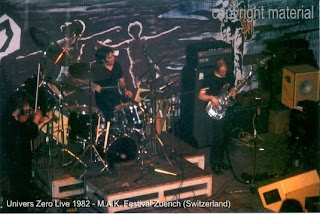A
review of the Magma show at the Highline Ballroom on the Rolling Stone website.
I will write my own review when I get some time.
Here is a copy of the Rolling Stone review, taken from their website. All copyrights are from Rolling Stone Magazine, and the article is reprinted here without the explicit permission of Rolling Stone. (If Rolling Stone wants me to remove the text, then contact me.)
A Prog-Rock Legend Returns: Magma’s Heavy Music and Alien Tongues
David Fricke
Since its inception in 1969, the French progressive-rock ensemble
Magma have made a curiously heavy music: a dark complex momentum in which the drums — played by leader-composer
Christian Vander — are the forward instrument, often flanked by heavily fuzzed bass guitar and the hard watery ring of a Fender Rhodes piano, with an operatic chorale narrating, in a made-up language, extended fictions about the people and wars on the planet Kobaïa. Magma's rigorous, eccentric execution of Vander's continuing fantasia may be the least likely survivor of rock's Euro-prog peak in the early and late ‘70s. (A Philip Glass spectacle girded in doom-metal chain mail is a distant but not inappropriate comparison.) At New York's Highline Ballroom on September 20th, Vander and his wife, vocalist
Stella Vander led a Magma in which most of the other players looked a lot younger than the band itself. But this Magma also sounded, amazingly, very much like the one that made the 1970 debut,
Kobaîa. In fact, the encore was the title song from that double-album.
Everything else the eight-piece group played was new: two as-yet-unreleased pieces in the first hour; all of the 2009 album,
Ëmëhntëtt-Rê, in the second. The lyrics were literally alien and the singing just as otherworldly — Stella Vander, Isabelle Feuillebois and Hervê Aknin alternated between eerie passages of medieval-like chant and martial ensemble arias — so the power in the music was entirely physical. That had a lot to do with Christian Vander, a John Coltrane disciple who combines a jazz drummer's language and touch with the heavy British agility of Bill Bruford and Mitch Mitchell. One mad passage in the second hour was a high-speed series of tortuous Vander figures matched with pinpoint timing on the other instruments, like the tangled bridge in King Crimson's "21st Century Schizoid Man." Another section was hellish grandeur: fat pounding chords, laden with low booming overtones, with the vocalists accenting Vander's drum spasms with unison crashes on hand-held Chinese cymbals.
The Highline show was part of a short tour — two dates — by a band that in its initial heyday seemed more like a myth, issuing strange records from an imagined quadrant of the universe. And there were moments when this band fell a little short of the legend, as when pianist Bruno Ruder took off on a long unaccompanied solo that was, for all of its energy, not much above heated noodling. Even with his distortion set on lethal, bassist Phillipe Bussonnet couldn't quite match the truly devouring tone of Magma's great mid-‘70s bassist Jannick Top, a guy who sounded like he had Bootsy Collins and Lemmy of Motörhead coming through his strings at once.
But that is connoisseur talk. After four decades, there is still nothing in rock — prog or otherwise — like Magma. At least in this world.








